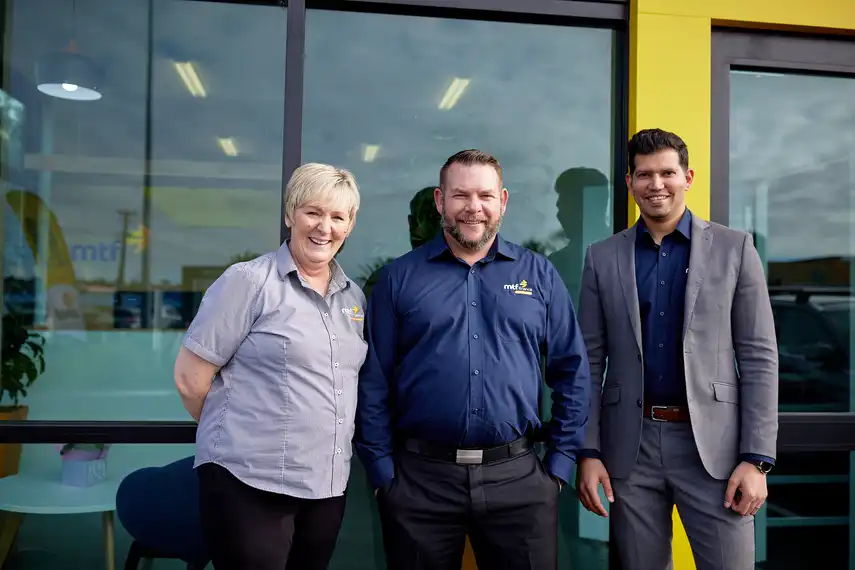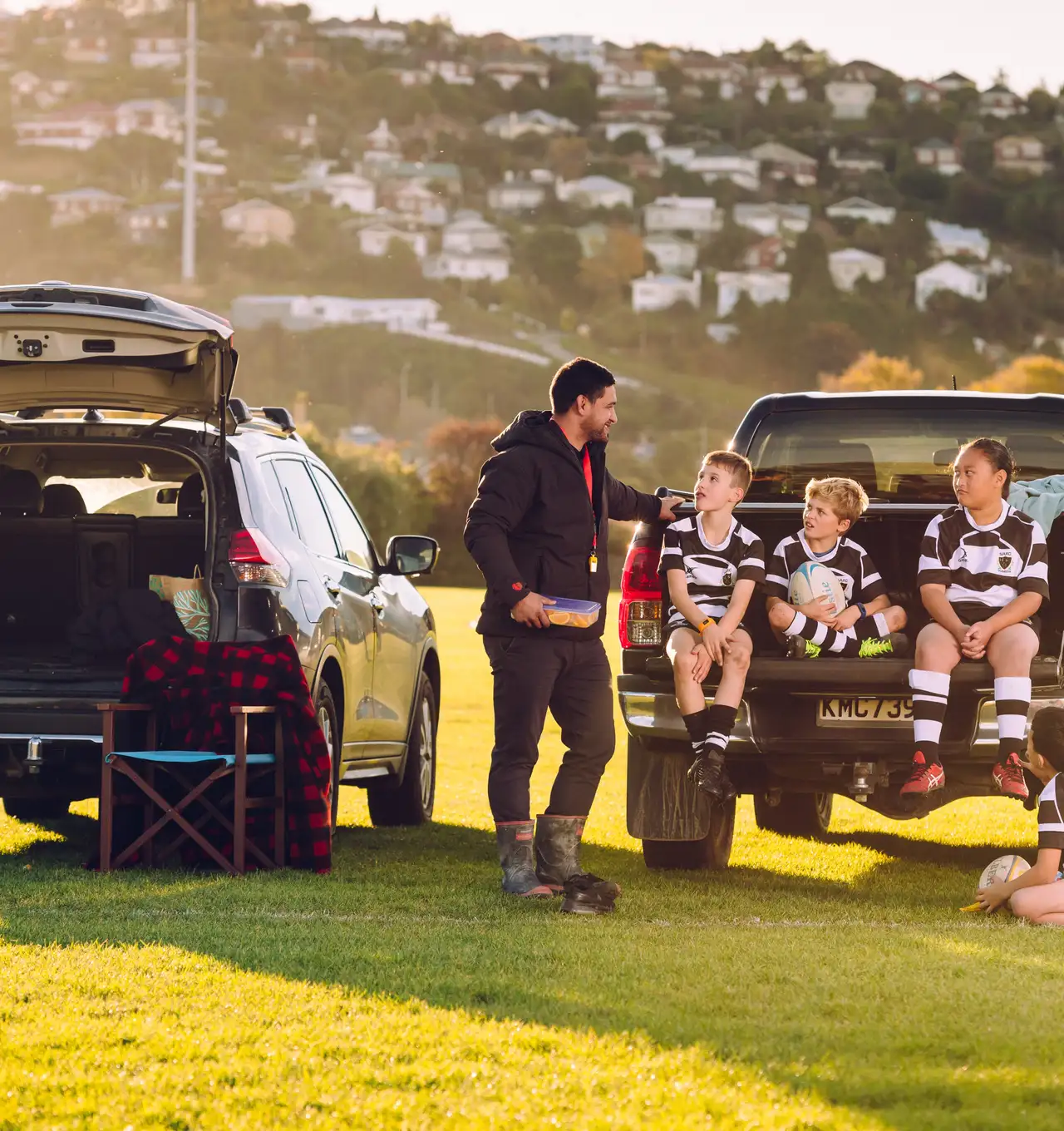There are plenty of cars, bikes and other vehicles to choose from – but there’s probably only one that’s right for you and your needs. So how do you find the perfect car for you?
Luckily, we were able to pull in Rhys Pocklington of Black and White Motors in Christchurch to tell us what you need to consider when you’re looking for a car that fits the whole family. Here’s what he had to say.
There’s no such thing as a perfect car!
Unfortunately, it doesn’t exist. One of the first things I learned when I started in the dealership industry is that everyone wants different things at different stages in their life journeys.
When you’re starting out, the right car might be something cheap and cheerful that can get you to work and the beach on the weekend. But as you change jobs and lifestyle, so do your needs and wants. Safety for your kids, a kitted out stereo, space for a dog or firewood or surfboards, going electric for commuting, or even just getting something fun on the road – all these change what’s going to make a vehicle right for you. We all live different lives, and a copy-paste solution would make for a boring world of driving.
Get to know the qualification process
We all want to find a car that we like the look of – but more importantly, will it suit our needs?
Let’s be totally transparent: it’s unlikely that you’ll find a car that ticks all your boxes. That’s why it’s important to go into a car yard with an open mind, and a list of must-haves and wants, your negotiables and your non-negotiables – just make sure you’re prepared to talk about them with your local dealer.
The perfect car might not exist, but let’s find a car that you’re proud and happy to drive.
Here’s what you need to be thinking about when you look for your next car or vehicle:
Looking for a new vehicle? Talk to one of our MTF Finance approved dealers or our MTF Finance offices.
Safety first
No one ever hits the road planning on having an accident. But you should be prepared.
Safety is my biggest concern, personally. You can fix a car, but you can’t fix a life lost on the road. And it’s often not until you experience something like an accident that you realise just how prepared you really are.
Which of these are critical for you – and what’s negotiable?
- Airbags
- Anti-lock brakes
- High-strength automotive glass
- Overspeed warnings
- Seatbelts (less of a concern today, but older cars might be lacking)
- Electronic stability control
- Crash test performance and RightCar ratings
- Tyre wear and performance. When was the last alignment?
- Isofix or isofit anchor points for child seats
Storage, seats, and access
Storage space is typically in proportion to the size of a car. But think about what works for you – do you need room for a surfboard, or a pet, or will a bread bin-sized boot do for you?
If you put safety first, and you find a car that meets all your safety requirements but doesn’t have storage space – then is it possible to have a roof rack and a cargo carrier or put on when needed?
Some questions are more obvious than others – like if you’ve got five kids, a seven-seater will do you well. One little one and no pets, and a five-seater car will probably be plenty.
Ask yourself about:
- The number of seats you’ll need between now and your next big lifestyle change
- Cargo space
- Roof racks
- Ease of getting kids in and out of car seats
- Vehicle height – especially for cargo, and for older people
- Again, isofix points for kid seats
- Comfort features – like heated seats, defrost modes (great for the South Island life)

Finance your next vehicle through our nationwide network of MTF Finance offices or approved dealers.
Electronics
I don’t just mean whether you’ve got manual windows, but the whole electronic dash experience, including audio performance.
What of the following do you need, what do you want, and what would be nice?
- Bluetooth, Apple CarPlay and Android Auto, 3.5mm audio jack, CD player, or 8 track (yup, they still exist!)
- Reversing camera
- 360-degree parking camera
- Proximity sensors
- Car alarm/immobiliser
- Additional lights (and the bars to fix them)
- Remote and central locking
- Dashcams (typically an add-on)
Performance and economy
Getting the most out of your fuel will continue to be a major issue, even as we shift to electric cars over the next couple of decades.
As a general rule, power and economy are opposites: the most efficient, smell-of-an-oily-rag cars won’t have the guts to tow a trailer sailer, so balancing these according to your needs will be a major point to discuss when choosing your next car. Think about towing capacity, fuel economy, and whether there’s an option to switch between modes (e.g. from 8 to 4 cylinders at a time). How much power do you really need – and does it fit the bill?
The related point is how you intend to drive. As I mentioned above, an electric car like a second hand Nissan Leaf is ideal if you’re commuting to work and staying around town. Though they will generally handle the open road just fine, you may find long-distance drives are better suited to hybrids or gas cars where they hit their efficiency stride.
Style
Let’s be honest – a good looking vehicle is a fine thing to have. And everyone’s taste is subjective. What’s cool in your 20s might not cut the mustard when you’re in your 30s.
Here’s what you should balance:
- Wheels, including size and rims
- Paint colour and finish
- Tinted windows
- Stereo power
- Engine sound
- Interior style – including seat colour and material
- Most importantly – are you proud to drive it?

There are options to suit every budget and lifestyle
Budget
Next to style, budget is often #2 concern for a lot of people – and it brings together everything we’ve covered.
Of course, the more features you want – across safety, style, performance, electronics, and anything else – the more that’s going to influence your budget and the cost of your next vehicle. And like all of the other aspects, it’s going to be a balancing act. You could want a $10,000 car and have the budget for $15,000 or for $5,000 – and so what’s negotiable will soon come to the front of the conversation.
The outright cost of a new vehicle also should be balanced against the ongoing costs. A vintage car, for example, will have higher maintenance costs (including insurance) and a higher petrol bill than a modern car of the same engine size. Electric cars are significantly cheaper to run, but tend to have a higher purchase price.
When you look at new cars, you should also consider financing options, spreading the cost of a new vehicle over months or years, or laying down cash for the sale all at once. For some, it makes more sense to handle a single payment and put a line under it; for others, financing means keeping that cash for the house or a holiday and arranging for the cost to come out weekly or fortnightly.
Getting behind the wheel
On paper, a car can tick all the boxes and have the right look. You might even have made space in the garage or driveway ready for it!
But what’s more important is getting into the driver’s seat and feeling what the car’s like.
No matter which dealer or seller you visit, once you’ve done your own due diligence on the above aspects, you need to get behind the wheel and understand the power and ride, the suspension and comfort, and how easy it’ll be to drive. You may have narrowed down your options to two or three – so which one is going to be more of a pleasure to drive in?
Ultimately, your choice is yours alone, and my preferences aren’t the same as yours. You can always say no to an offer if it doesn’t suit you, but you should know what’s right before you say yes! Get yourself into a car that’s right for you and your needs – one where you know what it has and what it doesn’t and are ready to hit the road.
Happy driving out there.
We hope you enjoy many years of hassle-free driving! For any questions about financing your next vehicle, give us a call - our team will be happy to talk you through it.

